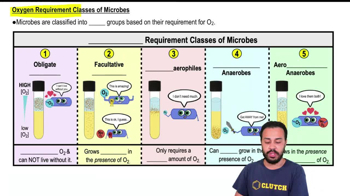During exercise, the cardiovascular system must supply muscles with large amounts of oxygen and fuel and get rid of a lot of wastes. How do the cardiovascular systems of athletes respond to prolonged exercise? Researchers used echocardiography, a sonogram of the heart, to estimate the mass of the left ventricle in current athletes, non-athletes, and ex-athletes. The data are graphed below (*** means P<0.001, and the P value comparing non-athletes and ex-athletes is >0.05). What conclusion can be drawn from the graph?
Ch. 42 - Gas Exchange and Circulation
Chapter 41, Problem 16
During exercise, the cardiovascular system must supply muscles with large amounts of oxygen and fuel and get rid of a lot of wastes. How do the cardiovascular systems of athletes respond to prolonged exercise? Athletes are not the only people with enlarged hearts. Many patients with cardiovascular disease also have enlarged hearts. Suggest a cause of this enlargement.
 Verified step by step guidance
Verified step by step guidance1
1. During prolonged exercise, the cardiovascular system of athletes responds by increasing the heart rate and stroke volume. This is to ensure that more blood, and therefore more oxygen and nutrients, are delivered to the working muscles. The blood vessels in the muscles also dilate to allow for increased blood flow. Additionally, the body increases its rate of respiration to take in more oxygen and expel more carbon dioxide, a waste product of cellular respiration.
2. The heart, like any other muscle, adapts to the increased workload by becoming larger and stronger. This is known as cardiac hypertrophy. In athletes, this is a healthy adaptation as it allows the heart to pump more blood with each beat, increasing the efficiency of oxygen and nutrient delivery to the muscles.
3. However, in patients with cardiovascular disease, an enlarged heart, or pathological cardiac hypertrophy, is often a sign of an underlying problem. This could be due to high blood pressure (hypertension), heart valve disease, or heart attack. These conditions force the heart to work harder to pump blood, leading to the enlargement of the heart muscle.
4. In pathological cardiac hypertrophy, the heart muscle becomes thicker, which can decrease the heart's ability to pump blood effectively. This can lead to further complications such as heart failure.
5. Therefore, while an enlarged heart in athletes is a healthy adaptation to increased physical demand, an enlarged heart in patients with cardiovascular disease is a sign of an underlying problem and can lead to serious health complications.

Verified Solution
Video duration:
1mWas this helpful?
Key Concepts
Here are the essential concepts you must grasp in order to answer the question correctly.
Cardiovascular Adaptations to Exercise
During prolonged exercise, the cardiovascular system adapts by increasing heart rate, stroke volume, and cardiac output to meet the heightened demand for oxygen and nutrients by the muscles. These adaptations enhance the efficiency of oxygen delivery and waste removal, allowing athletes to perform at higher intensities for longer periods.
Recommended video:

Adaptive Radiation
Cardiac Hypertrophy
Cardiac hypertrophy refers to the enlargement of the heart muscle, which can occur in response to increased workload, such as that experienced by athletes during intense training. This physiological adaptation can improve cardiac efficiency; however, it can also be a pathological response in individuals with cardiovascular disease, where the heart enlarges due to stress or damage.
Recommended video:
Guided course

Cardiac Cycle
Oxygen Debt and Recovery
Oxygen debt is the amount of oxygen required to restore the body to its resting state after exercise. During intense physical activity, the body may not receive enough oxygen to meet energy demands, leading to anaerobic metabolism. Post-exercise, the cardiovascular system works to repay this debt by increasing oxygen intake and enhancing blood flow to tissues, facilitating recovery and waste removal.
Recommended video:
Guided course

Oxygen Requirement Classes of Microbes
Related Practice
Textbook Question
418
views
Textbook Question
During exercise, the cardiovascular system must supply muscles with large amounts of oxygen and fuel and get rid of a lot of wastes. How do the cardiovascular systems of athletes respond to prolonged exercise? Explain the advantage of the observed difference between current athletes and non-athletes in the graph shown here.
333
views
Textbook Question
During exercise, the cardiovascular system must supply muscles with large amounts of oxygen and fuel and get rid of a lot of wastes. How do the cardiovascular systems of athletes respond to prolonged exercise? Researchers have also observed that athletes and non-athletes have the same mean resting cardiac output, even though athletes have a far lower resting heart rate. How is this possible?
441
views
